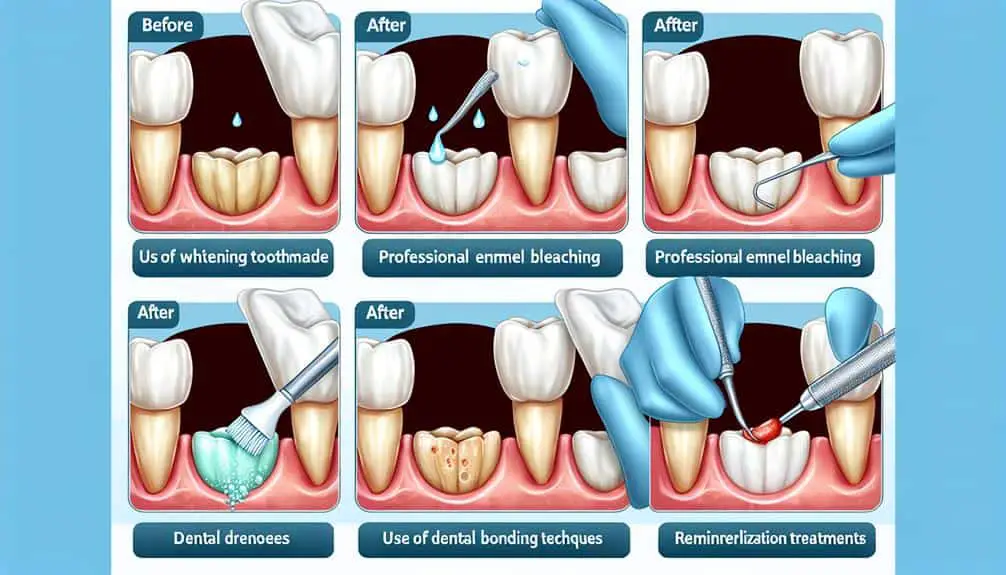If you have sensitive enamel and desire to whiten your teeth safely, opt for gentle whitening products with enamel-friendly ingredients like potassium nitrate or fluoride. Be cautious with abrasive toothpaste and consider using whitening pens or gels for targeted results. Remember to brush gently with a soft-bristled toothbrush, limit whitening treatments, and maintain good oral hygiene practices. Safeguarding your enamel's health is essential, so prioritize enamel-safe products and consult professionals if needed. Prioritizing enamel health through proper care and suitable products is key to achieving your whitening goals while preserving enamel strength.
Key Points
- Choose gentle whitening products with enamel-friendly ingredients.
- Practice safe whitening techniques to protect sensitive enamel.
- Use enamel-safe products and follow instructions for moderate whitening.
- Seek professional advice for extremely sensitive enamel concerns.
- Maintain enamel health with proper oral hygiene and calcium-rich foods.
Understanding Enamel Sensitivity
If you experience tooth pain when consuming hot or cold foods, you may have sensitive enamel, a condition that requires important care and specialized treatments for whitening. Enamel protection is vital to maintaining oral health. Sensitivity triggers such as acidic foods, aggressive brushing, or teeth grinding can compromise the enamel, leading to discomfort. To protect your enamel, avoid abrasive toothpaste and harsh whitening products that can worsen sensitivity. Opt for a soft-bristled toothbrush and fluoride toothpaste to strengthen enamel. Regular dental check-ups can help monitor enamel health and address any issues promptly.
Understanding enamel sensitivity involves recognizing the signs, like sharp pain or discomfort when consuming certain foods or beverages. It's crucial to identify and eliminate sensitivity triggers to prevent further enamel erosion. By practicing good oral hygiene habits and using enamel-friendly products, you can maintain a healthy smile while addressing sensitivity concerns effectively. Remember, important care is key to protecting and preserving your enamel for long-term oral health.
Choosing Gentle Whitening Products
Consider selecting gentle whitening products designed to protect sensitive enamel while effectively brightening your smile. When choosing whitening products for sensitive enamel, look for enamel-friendly ingredients such as potassium nitrate or fluoride, which can help minimize sensitivity and strengthen enamel. Opt for products that are specifically formulated for individuals with enamel sensitivity. These products often contain lower concentrations of whitening agents to reduce the risk of enamel damage.
Effective alternatives to traditional whitening products include whitening toothpaste, which can gently remove surface stains without harsh abrasives that may harm enamel. Whitening strips with lower peroxide levels can also be a suitable option for sensitive teeth. Additionally, whitening pens or gels that are applied directly to the teeth allow for targeted whitening and may be less abrasive on enamel.
Techniques for Safe Whitening
Explore gentle brushing techniques to safely whiten your teeth without causing enamel sensitivity. When whitening your teeth with sensitive enamel, it's important to prevent damage and prioritize enamel protection.
Start by using a soft-bristled toothbrush to gently brush your teeth in circular motions. Avoid vigorous scrubbing, as this can wear down enamel and lead to increased sensitivity. Additionally, consider using a toothpaste specifically designed for sensitive teeth to provide extra care.
Another technique for safe whitening is to limit the frequency of whitening treatments. Overdoing it can strip away enamel and worsen sensitivity. Follow the instructions provided with your whitening product carefully to ensure you're using it in moderation.
Furthermore, incorporate flossing into your oral care routine to remove plaque and prevent staining between teeth. This simple step can contribute to a brighter smile without compromising enamel health.
Precautions for Sensitive Enamel
To safeguard your sensitive enamel while whitening your teeth, make sure you follow proper precautions and gentle techniques. When dealing with sensitive enamel, it's important to take extra care to prevent damage. Here's a list of precautions to keep in mind:
- Use enamel-safe products: Opt for whitening products specifically designed for sensitive teeth to avoid causing harm to your enamel.
- Avoid acidic substances: Acidic foods and drinks can weaken enamel, making it more susceptible to damage during whitening treatments.
- Follow instructions carefully: Always adhere to the recommended usage instructions provided with whitening products to prevent overuse or misuse.
- Consider professional advice: If you have extremely sensitive enamel, consult with a dentist before starting any whitening regimen to ensure it's safe for your teeth.
- Practice good enamel care: Maintain good oral hygiene practices, such as regular brushing and flossing, to preserve the health of your enamel while whitening your teeth.
Maintaining Enamel Health
To maintain enamel health while whitening your teeth, adhere to proper oral hygiene practices and consider using enamel-safe products designed for sensitive teeth. Brush your teeth at least twice a day with a soft-bristled toothbrush and fluoride toothpaste to remove plaque and prevent erosion of the enamel. Floss daily to clean between teeth and prevent decay in hard-to-reach areas. Consider using a mouthwash that's gentle on enamel and helps fight bacteria that can harm your teeth.
In addition to proper oral hygiene, incorporate enamel-friendly foods into your diet to support enamel health. Foods high in calcium, such as dairy products and leafy greens, can help strengthen enamel. Avoid sugary and acidic foods and beverages that can erode enamel and lead to sensitivity.
Frequently Asked Questions
Can Whitening Toothpaste Be Used on Sensitive Enamel?
You can use whitening toothpaste on sensitive enamel, but make sure it offers enamel protection and sensitivity prevention. Look for gentle formulas to avoid irritation. Consult your dentist for personalized recommendations to maintain oral health.
Are There Any Natural Alternatives to Commercial Whitening Products for Sensitive Enamel?
You can explore various natural remedies and DIY solutions for sensitivity relief. Enamel-friendly options like baking soda and hydrogen peroxide can be effective. Remember, even the most delicate enamel can benefit from these gentle yet potent treatments.
How Long Does It Typically Take to See Results When Using Gentle Whitening Products?
To see results with gentle whitening products for sensitive enamel, it usually takes a few weeks. Your enamel's health is key during this process. Be patient and consistent to balance whitening effectiveness with sensitivity concerns.
Can Professional Teeth Whitening Treatments Be Safe for Sensitive Enamel?
Professional teeth whitening treatments can be safe for sensitive enamel when done correctly. Enamel protection techniques and sensitivity management protocols are essential. Consult a dentist for personalized advice on how to achieve a whiter smile without compromising your enamel.
Are There Any Specific Foods or Drinks That Should Be Avoided to Prevent Enamel Sensitivity While Whitening Teeth?
To prevent sensitivity while whitening teeth, focus on an enamel-friendly diet. Avoid acidic foods like citrus and drinks like soda. Opt for dairy products rich in calcium to strengthen enamel. Consistent care is key.



